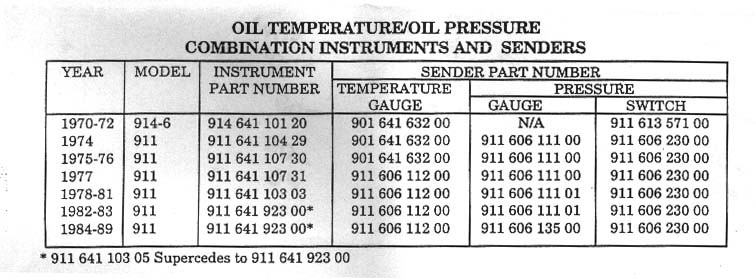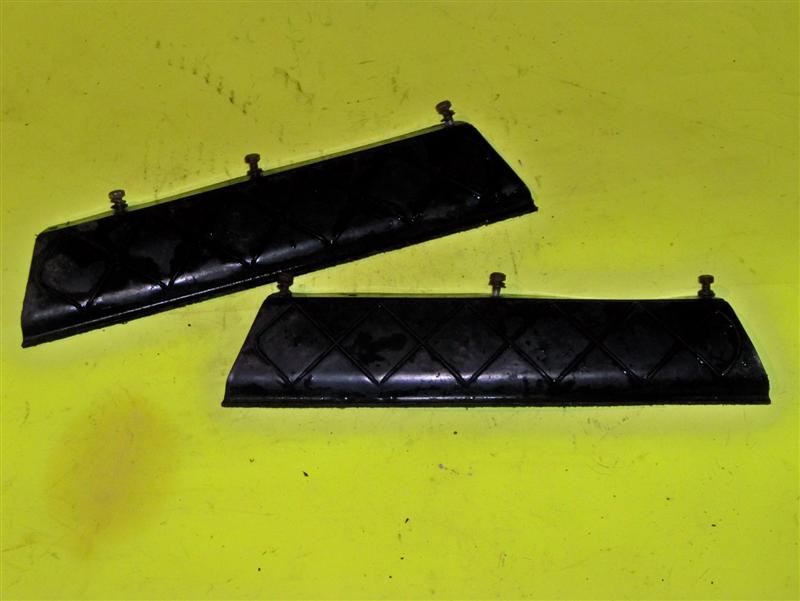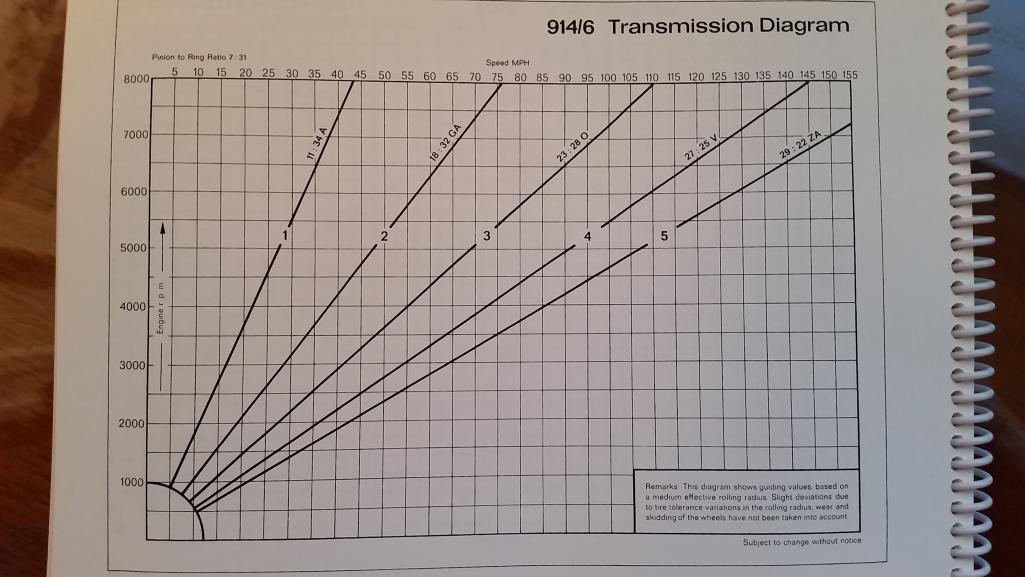|
|

|
Porsche, and the Porsche crest are registered trademarks of Dr. Ing. h.c. F. Porsche AG.
This site is not affiliated with Porsche in any way. Its only purpose is to provide an online forum for car enthusiasts. All other trademarks are property of their respective owners. |
|
|
  |
| porschetub |
 Feb 27 2017, 01:35 PM Feb 27 2017, 01:35 PM
Post
#21
|
|
Advanced Member     Group: Members Posts: 4,764 Joined: 25-July 15 From: New Zealand Member No.: 18,995 Region Association: None |
You would hope that the OP's engine builder allowed for the extra displacement when rejetting the carbs,I don't have webers but I know on the 914/6 and 911 carbs of that era the idles ,mains and vents were small much like the jetting in the latter zeniths.
Perrys comment about bearing is a valid one, cases are sometimes torqued up without checks for free rotation of the crankshaft,also were the rings "gapped" properly in the pistons ?,have the valve clearances been rechecked after the initial ''run in'' ?,I would suggest that the OP limits driving the car and returns it to the engine builder asap. |
| porbmw |
 Feb 27 2017, 01:38 PM Feb 27 2017, 01:38 PM
Post
#22
|
|
Senior Member    Group: Members Posts: 813 Joined: 10-September 08 From: Vancouver, B.C. Member No.: 9,534 Region Association: None 
|
There are far more knowledgeable persons than I who have already weighed in on this.
However, there may be one other means of helping to lower engine heat...by increasing air flow...by using the two air deflectors that later models of 914s were supplied with...If I recall correctly, in around 73/74...affixed to the underside, one on each side of the underbody, just in front of the engine |
| porschetub |
 Feb 27 2017, 03:41 PM Feb 27 2017, 03:41 PM
Post
#23
|
|
Advanced Member     Group: Members Posts: 4,764 Joined: 25-July 15 From: New Zealand Member No.: 18,995 Region Association: None |
There are far more knowledgeable persons than I who have already weighed in on this. However, there may be one other means of helping to lower engine heat...by increasing air flow...by using the two air deflectors that later models of 914s were supplied with...If I recall correctly, in around 73/74...affixed to the underside, one on each side of the underbody, just in front of the engine Yea good point,I believe they really made a difference. Not sure in this cause perhaps things are a little deeper (IMG:style_emoticons/default/sad.gif) . |
| 767driver |
 Feb 27 2017, 04:14 PM Feb 27 2017, 04:14 PM
Post
#24
|
|
Newbie  Group: Members Posts: 34 Joined: 13-January 12 From: Baltimore, MD Member No.: 14,002 Region Association: MidAtlantic Region |
There are far more knowledgeable persons than I who have already weighed in on this. However, there may be one other means of helping to lower engine heat...by increasing air flow...by using the two air deflectors that later models of 914s were supplied with...If I recall correctly, in around 73/74...affixed to the underside, one on each side of the underbody, just in front of the engine I know these exist, but have never seen them. Anyone have pics or a source for the parts? Apparently they help create a low pressure area under the engine bay thereby increasing the total airflow through the engine bay. |
| mskala |
 Feb 27 2017, 04:20 PM Feb 27 2017, 04:20 PM
Post
#25
|
|
R    Group: Members Posts: 1,928 Joined: 2-January 03 From: Massachusetts Member No.: 79 Region Association: None 
|
If you want to check the various gauge components:
 |
| rgalla9146 |
 Feb 27 2017, 05:18 PM Feb 27 2017, 05:18 PM
Post
#26
|
|
Advanced Member     Group: Members Posts: 4,676 Joined: 23-November 05 From: Paramus NJ Member No.: 5,176 Region Association: None 
|
An additional oil cooler should not be necessary on an engine of your displacement and state of tune.
Hole in firewall ? oh please ! If your car does not have an original (914 6) flywheel mark the one you have at TDC and use an adjustable timing light to check proper timing. There are various methods for determining true TDC |
| Cairo94507 |
 Feb 27 2017, 05:54 PM Feb 27 2017, 05:54 PM
Post
#27
|
|
Michael           Group: Members Posts: 10,173 Joined: 1-November 08 From: Auburn, CA Member No.: 9,712 Region Association: Northern California 
|
 Here they are. I believe they came standard beginning in '73. I am adding these (I know, my Six did not come with them) on my car because it can't hurt to get a little more air flow for the motor. |
| Justinp71 |
 Feb 27 2017, 06:40 PM Feb 27 2017, 06:40 PM
Post
#28
|
|
Senior Member    Group: Members Posts: 1,606 Joined: 11-October 04 From: Sacramento, CA Member No.: 2,922 Region Association: None 
|
Here they are. I believe they came standard beginning in '73. I am adding these (I know, my Six did not come with them) on my car because it can't hurt to get a little more air flow for the motor. Hmm, I wondered what those were for. I guess these help because at higher speeds the flow across the bottom of the car is too strong for the air coming thru the engine to merge? Does anyone know? |
| Justinp71 |
 Feb 27 2017, 06:48 PM Feb 27 2017, 06:48 PM
Post
#29
|
|
Senior Member    Group: Members Posts: 1,606 Joined: 11-October 04 From: Sacramento, CA Member No.: 2,922 Region Association: None 
|
In 60f Weather on the freeway I'd think the car should stay under 200f Oil Temp.
How does the engine run? If its lean with carbs I'd think it wouldn't feel very smooth in transition from idle to mains. I'd also look for a blockage in the air system or a slipping/bad belt like others have mentioned. Does it have a 5 blade fan? Maybe the wrong belt pulleys were used and the fan runs too slow? If that was the case you'd probably have an alternator problem at night when the lights are on. |
| 914forme |
 Feb 27 2017, 07:41 PM Feb 27 2017, 07:41 PM
Post
#30
|
|
Times a wastin', get wrenchin'!     Group: Members Posts: 3,896 Joined: 24-July 04 From: Dayton, Ohio Member No.: 2,388 Region Association: None 
|
What RPM is your engine turning on these highway runs?
I do believe there was a reason the factory installed a Z gear in fifth instead of the ZD in the -6. It is about a 200 RPM difference, not a huge deal, but at low RPM that 200 RPM could make a difference. Especially if you are bogging the engine a bit. What happens when you drop down into 4th? |
| toolguy |
 Feb 27 2017, 08:02 PM Feb 27 2017, 08:02 PM
Post
#31
|
|
Senior Member    Group: Members Posts: 1,275 Joined: 2-April 11 From: San Diego / El Cajon Member No.: 12,889 Region Association: Southern California 
|
What RPM is your engine turning on these highway runs? I do believe there was a reason the factory installed a Z gear in fifth instead of the ZD in the -6. Increased cooling with the higher RPM's is exactly the reason the factory used the Z 5th in Six's. . Have you checked you oil level when the motor is hot. . full 9 quarts?. . 30 psi at freeway speed is low. |
| billh1963 |
 Feb 28 2017, 02:37 PM Feb 28 2017, 02:37 PM
Post
#32
|
|
Car Hoarder!     Group: Members Posts: 3,405 Joined: 28-March 11 From: North Carolina Member No.: 12,871 Region Association: South East States |
What RPM is your engine turning on these highway runs? I do believe there was a reason the factory installed a Z gear in fifth instead of the ZD in the -6. Increased cooling with the higher RPM's is exactly the reason the factory used the Z 5th in Six's. . Have you checked you oil level when the motor is hot. . full 9 quarts?. . 30 psi at freeway speed is low. My CIS 2.7L runs on the cool side (I posted about it a couple months ago). You shouldn't need an external oil cooler. Installing an AFR gauge will tell you if you are lean 30 psi at 3K rpm is still within accepted norms (10 psi per 1K). However that is for a more worn 911 engine. I think he should see higher. But, if his oil is running over 220F he absolutely would see lower oil pressure even with a recently rebuilt engine. |
| Dave_Darling |
 Feb 28 2017, 02:48 PM Feb 28 2017, 02:48 PM
Post
#33
|
|
914 Idiot                Group: Members Posts: 15,075 Joined: 9-January 03 From: Silicon Valley / Kailua-Kona Member No.: 121 Region Association: Northern California 
|
I guess these help because at higher speeds the flow across the bottom of the car is too strong for the air coming thru the engine to merge? Does anyone know? Something like that. The flaps create turbulence behind them, which is slightly lower pressure than the other ambient air. That lower pressure helps pull air through the cooling fins on the engine. It's not a huge effect by any means, but it is there. --DD |
| 767driver |
 Feb 28 2017, 04:24 PM Feb 28 2017, 04:24 PM
Post
#34
|
|
Newbie  Group: Members Posts: 34 Joined: 13-January 12 From: Baltimore, MD Member No.: 14,002 Region Association: MidAtlantic Region |
I haven't driven the car in a couple of days and it's new to me so I am going from memory here...
I want to say the RPMs are about 3500 at 80mph. The PO said the car had airport gears in it and that he did not like the high RPMs on the highway. Said he replaced 4th and 5th with normal gears. Don't know what those are but I can tell you the RPM drops a full 1000 going from 3rd to 4th...that seems like a lot. And 5th is pretty tall now. Also car is said to have a 930 LSD. |
| 767driver |
 Feb 28 2017, 04:43 PM Feb 28 2017, 04:43 PM
Post
#35
|
|
Newbie  Group: Members Posts: 34 Joined: 13-January 12 From: Baltimore, MD Member No.: 14,002 Region Association: MidAtlantic Region |
And now I have found this thread...see posts 5 and 7.
http://forums.pelicanparts.com/porsche-914...ear-ratios.html Damn...could it really be that simple?? ANSWER:NO... I drove the car at highway speeds using 4th instead of 5th...still got hot. |
| gereed75 |
 Feb 28 2017, 05:10 PM Feb 28 2017, 05:10 PM
Post
#36
|
|
Senior Member    Group: Members Posts: 1,323 Joined: 19-March 13 From: Pittsburgh PA Member No.: 15,674 Region Association: North East States 
|
Rgalla, not trying to be argumentative or steal this thread, but how does retarded timing increase temps??
My understanding is that timing advanced beyond optimal increases peak internal combustion pressure. That higher pressure results in higher heat and reduces engine output. What mechanism/physics makes retarded timing produce more heat/higher temps?? |
| 767driver |
 Feb 28 2017, 05:11 PM Feb 28 2017, 05:11 PM
Post
#37
|
|
Newbie  Group: Members Posts: 34 Joined: 13-January 12 From: Baltimore, MD Member No.: 14,002 Region Association: MidAtlantic Region |
|
| mskala |
 Feb 28 2017, 09:21 PM Feb 28 2017, 09:21 PM
Post
#38
|
|
R    Group: Members Posts: 1,928 Joined: 2-January 03 From: Massachusetts Member No.: 79 Region Association: None 
|
Don't assume speedo and tach are super accurate. Also, those graphs would be
true only with the original tire diameters. Not to sound like I'm putting down your car, but really it looks like you have so many unknowns that there is no way to even come up with a reasonable guess at what's going on over the interwebs. I think you're in for a lot of local investigation. Why did somebody have an engine rebuild then sell the car without driving it? (you said it now has less than 600 miles). There are shitty engine builders and/or mechanics out there. |
| Kansas 914 |
 Mar 1 2017, 09:02 AM Mar 1 2017, 09:02 AM
Post
#39
|
|
Advanced Member     Group: Members Posts: 2,999 Joined: 1-March 03 From: Durango, Colorado Member No.: 373 Region Association: Rocky Mountains 
|
Don't assume speedo and tach are super accurate. Also, those graphs would be true only with the original tire diameters. (IMG:style_emoticons/default/agree.gif) |
| rgalla9146 |
 Mar 1 2017, 11:07 AM Mar 1 2017, 11:07 AM
Post
#40
|
|
Advanced Member     Group: Members Posts: 4,676 Joined: 23-November 05 From: Paramus NJ Member No.: 5,176 Region Association: None 
|
Rgalla, not trying to be argumentative or steal this thread, but how does retarded timing increase temps?? My understanding is that timing advanced beyond optimal increases peak internal combustion pressure. That higher pressure results in higher heat and reduces engine output. What mechanism/physics makes retarded timing produce more heat/higher temps?? Retarded timing allows partial combustion pressure to escape through the opening exhaust valve which raises cyl. head/ oil temp. There is more to it than that. Google ignition timing vs. engine temp |
  |
7 User(s) are reading this topic (7 Guests and 0 Anonymous Users)
0 Members:

|
Lo-Fi Version | Time is now: 15th January 2025 - 03:35 AM |
Invision Power Board
v9.1.4 © 2025 IPS, Inc.









